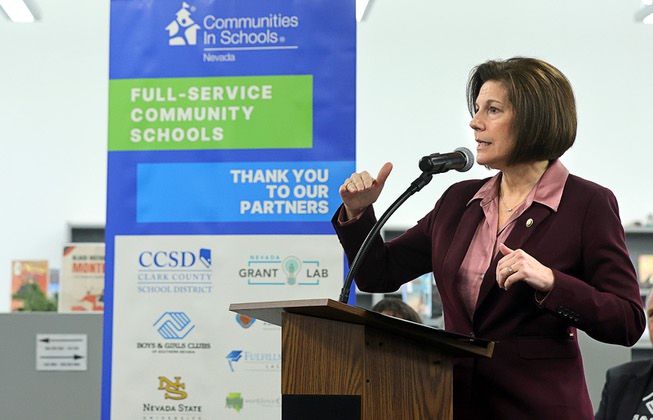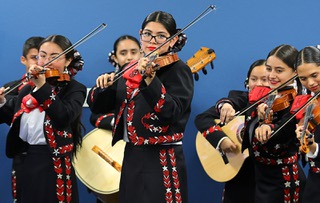
Sen. Catherine Cortez Masto, D-Nev., speaks during a Communities In Schools news conference at JD Smith Middle School Tuesday, Feb. 20, 2024. Communities in Schools of Nevada announced it has been awarded a five-year $11,852,258 grant from the United States Department of Education.
Wednesday, Feb. 21, 2024 | 2 a.m.
An $11.8 million federal grant will expand on-site social services at schools across Nevada, including J.D. Smith Middle School in North Las Vegas.
The campus was recently rebuilt but has been serving students for 74 years. The school sits in an older, inner-city nook of the valley where needs are high — about 1 in 3 children in the neighborhood lives in poverty, according to census data. They have the kinds of needs that a program like Communities in Schools of Nevada seeks to meet with dropout prevention and family support services: food, clothing, housing, emotional, moral and academic support that keeps children in school.
The nonprofit Communities in Schools of Nevada, which has been in the Clark County School District for 20 years, won the competitive five-year award from the U.S. Department of Education as part of the $74 million nationwide expansion of the federal Full-Services Community Schools grant program. It will apply the funds to six schools — two in Winnemucca, two in Elko and two in CCSD. The local schools are Smith and Rancho High School, which are about half a mile apart.
Tami Hance-Lehr, Communities in Schools of Nevada’s CEO and state director, said at a ceremony Tuesday at Smith that the new grant was “transformative.”
U.S. Sen. Catherine Cortez Masto, D-Nev., who advocated for the award with the rest of the state’s congressional delegation, said nearly 6,300 students would benefit from expanded services between the six schools.
“These thousands of students will access critical services to help them thrive and grow inside and outside the classroom,” she said. “We owe that to the next generation of leaders.”
U.S, Rep. Susie Lee, D-Nev., a longtime friend of Communities in Schools Nevada who once served as its president, said in a congratulatory video message that she hoped the program could come to every high-needs Nevada school.
Communities in Schools of Nevada already has a physical presence in 80 of CCSD’s roughly 360 schools, including Smith; it’s in about a quarter of Nevada schools statewide. Hance-Lehr said many of its services were accessed by referral, meaning families needed to go off-campus to receive some assistance. With the new funds, more of those partners will have a representative on campus.
Communities in Schools provides comprehensive services starting in grade school to children with attendance, behavior and academic struggles who are more likely to get to high school deficient in academic credits and ultimately drop out.
Boys & Girls Club of Southern Nevada, Boys Town Nevada, Fulfillment Fund Las Vegas, the Clark County department of juvenile justice services’ Harbor program, Nevada State University and Workforce Connections will now be able to place someone in-house. Other partners will be able to drop in. School staff will also get professional development through the grant.
Hance-Lehr said she hoped to tackle chronic absenteeism, a persistent problem post-pandemic.
Communities in Schools of Nevada said it was the only Nevada-based organization among the 30 grant recipients nationwide out of an applicant pool of 239..This is the first federal grant for the organization.
Last year, it got its first direct state appropriation when the state Senate and Assembly unanimously passed Senate Bill 189, or the Keeping Kids in School Act, putting $2 million into the program.

